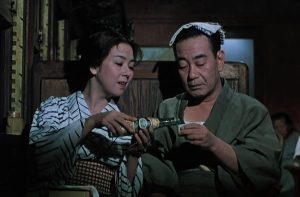Criterion once again pulls out all the stops for the great Yasujiro Ozu, reshooting the original film from the 1930s (unseen by me) with the more notable 1959 color update. Stocked with goodies, including a commentary track from Roger Ebert, the DVD is stunningly remastered and finally available in a form other than mangled VHS.As for the film, it is, well, so Ozu, which says it all if you are of the familiar and means nothing if you are an ignorant, xenophobic bastard who can’t get enough of Michael Bay. Relaxed, leisurely, and as subtle as a lazy day by the lake, Floating Weeds considers the lives of a traveling actor’s troupe as they hop from port to port in search of work, recognition, and perhaps a little escape. Lives intersect, of course, although Ozu favors quiet examinations of universal themes rather than melodramatic bullet points.And, being an Ozu film, the camera remains fixed and low to the ground, although it hardly matters with characters so engaging and authentic.Once again, it is easy to become enveloped in this world as it plays out as it must, without tidy resolutions or soothing homilies. Here, though, I was struck by a recurring image. Throughout, children wander from place to place (we never know where), always in the background and never contributing to the action in any direct way. Thankfully, there are no shots of unbearable cuteness, and we never really get to know any of them. And yet, there they are. Perhaps this matters little to someone who hasn’t seen the film, but for me the wandering children represent the best of Ozu — they are a point of reference, yes, but they also mirror life as it truly is. We see much as we scan our environment, but we don’t always have the answers for what we take in. And it is much better to imagine what the next sequence might be — or where these people go when out of sight — than to have the camera follow them to what must certainly be less inspiring than our speculations. Add to that some truly memorable cinematography (a confrontation in the rain will stay with you) and a faint tone of sadness. So very Ozu. |
